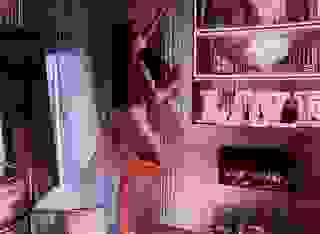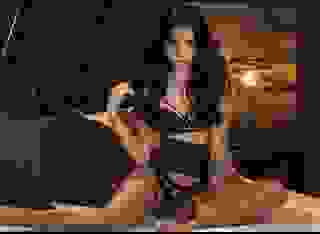- Non-Erotic
- Deep Damnation
- Page 3
Note: You can change font size, font face, and turn on dark mode by clicking the "A" icon tab in the Story Info Box.
You can temporarily switch back to a Classic Literotica® experience during our ongoing public Beta testing. Please consider leaving feedback on issues you experience or suggest improvements.
Click hereMelissa thought that her mother might have suffered a stroke. Anxiously she asked, "Mum? What's the matter? Mum? Are you ill?"
Peggy shook her head, not only to register denial but also to clear her brain. "Sit down, both of you. Let me think a minute."
Melissa and Ross sat and waited, solicitously watching Peggy's face. At last she spoke.
"I hoped I'd never have to speak of this to anyone, but now that you two have met, I'll have to tell you, in case you start getting feelings for each other," she began.
Melissa interrupted, "For goodness' sake, Mum, we've only known each other five minutes. I'm sorry, Ross. You know how embarrassing Mums can be."
"Be quiet, Melissa," Peggy admonished her. "This is serious. You'll understand when you've heard what I've got to tell you."
Uncontrite, Melissa said, "Well, get on with it then. What is this dark secret?"
<<<<<<<<<<<<<<<<<<
"Twenty or so years ago," Peggy began, "Duncan King and Peter Betcham were friends. Duncan was married to Gladys, and I was engaged to Peter. The two boys often went potholing together. I sometimes acted as their support team. Gladys used to stay at home. On their last trip Duncan wanted to test a theory he had about a particular fell.
"On one side of the fell there were caves, Burnwood Caves they were called. The other side of the fell was known as Annunside. The fell that side was studded with clefts and openings, some of which seemed to open or close with the weather. Duncan's theory was that there was a way through from Burnwood Caves, emerging somewhere on Annunside.
"The three of us, Duncan, Peter, and I, took two cars to the road that ran below Burnwood Caves. The plan was that one car would be left there, parked off the road. The boys would then climb up and enter the caves. I would drive around to the other side, Annunside, to pick them up if they got through. There was a pub there, called The Raven, where I could wait.
"If the weather was clear, I would be able to spot them on the moorside. If the weather closed in, I was to wait in the pub, and they would walk down and find me there. If they hadn't managed to get through, they would turn back to Burnwood Caves, pick up their car, and drive round to meet me at The Raven. That, we thought, covered all possibilities."
Peggy paused in thought as she recollected those events, then she pulled herself together and resumed her tale.
"I watched the boys climb up to the caves with some misgivings. I trusted Duncan to be sensible, but I wished he had a more competent partner. I knew that Peter didn't have Duncan's mettle.
"I waited on the other side of the hills as arranged," she continued, "but they didn't emerge and they didn't come round by car either. It got late, so I rang Gladys. She told me that there had been an accident, that Peter had got out safely, but Duncan had fallen to his death underground.
"That night the rain started. It was a rough night. Peter had said that Duncan could not possibly have survived. The authorities decided not to try to recover the body until the weather cleared. I didn't want to believe that Duncan was dead. I went back on my own, to Annunside, to search for him.
"I had my full bad weather walking gear on, and carried a backpack with sandwiches, hot coffee, first aid kit, and so on. The clouds lay on the tops of the hills, and the rain was heavy and constant. Water cascaded down the hillside. My torch was powerful, but even so it could hardly pierce the gloom. Rain in my face gathered on my eyelashes, and I had to keep blinking and wiping my eyes. The grass there grows in tussocks, and between them were puddles of water. It was hard going. As I slipped and stumbled I was afraid I might sprain my ankle, but I would not give up.
"It must have been the early hours of the morning when I stumbled across a body lying face down in water. I turned it over, and saw to my relief that it was not Duncan. The poor man was clearly dead. I reasoned that if he had been washed out of a cleft in the hillside, Duncan may have emerged from the same cleft, and so might be nearby.
"I shouted and looked around. Through the gloom I saw a dim flicker of light. I made my way towards it as fast as I could. It was Duncan lying on his back, one hand feebly waving his torch. I fell on my knees at his side, mumbling God knows what prayers.
"I gently felt him all over to see if he had any fractures or cuts, but could find none. I propped him up, and managed to get some hot coffee into him. In examining him I had removed the harness he was wearing. I saw that it had a short length of rope clipped to it. I put the harness and rope into my backpack.
"I wondered what was best to do. If I left him to go and get help it would be hours before it arrived, and I might have difficulty finding him again. I could get him warm and dry much sooner if he could make it down the hill to my car. I helped him to his feet. He was unsteady, but stayed upright. Together we slipped and slithered down to the road.
"I took him home - to my place I mean - and nursed him. Thankfully he wasn't physically injured, apart from a few scrapes and bruises, but he was utterly exhausted and chilled to the marrow. I cleaned him up, fed him hot broth, and put him to bed. He slept almost round the clock, and it was days before he could stay out of bed for more than a few hours at a time. At first his mind was confused and his speech rambling. He seemed to have no clear recollection of what had occurred.
"The weather began to clear, and they found the other body. To my astonishment, Gladys identified it as Duncan's. I didn't know what to do. Gradually Duncan regained his strength. When I asked him what had happened underground, he said he couldn't remember. Whether his mind had really blocked it out, or whether he just didn't want to talk about it, I don't know. I didn't press him. I had my own suspicions but I kept them to myself."
"Didn't you think to let his wife know that he was still alive?" Melissa asked, accusingly.
"Oh, I know it was wrong of me, but I loved him you see. So long as he was helpless I could keep him for myself. By the time he was able to know what was going on, Gladys had identified the other body as his. It was if she wanted him dead. I told Duncan what she had done, and he seemed relieved. He made no move himself to get in touch with her or anyone else. He was content to let me make all the decisions."
"What about the inquest?" Ross asked.
"That was held quite quickly. I went along, still undecided whether I was going to hold my tongue or make a dramatic announcement. When I saw Gladys and Peter together, and how they were with each other, I decided I couldn't let him fall into their clutches again.
"I'm sorry, Ross. I know that they are your parents, but I'm telling it how it was, as honestly as I can."
"I understand that, Mrs King. Please go on."
"I didn't tell any lies at the inquest. I was only called upon to say that I saw Duncan and Peter enter the caves together in the morning, and that Duncan did not come out the other side that day."
"That's a politician's excuse, Mother," Melissa said unsympathetically. "It was still dishonest to withhold relevant evidence, and there can't be anything much more relevant to an inquest than the fact that the corpse is not dead."
"I know that," Peggy agreed. "I'm not trying to justify what I did. I just want you to know what in fact happened."
Ross was looking pensive. "Now I can see what Mom was driving at," he said.
"Your mother?" Peggy asked. "Has she said something to you about it?"
"Not really," Ross replied. "She only said that she wanted me to keep away from Melissa, but she wouldn't say why. Now I know why, and I think she should have told me. At least you've been more honest with us, Mrs King. What happened after the inquest?"
"There's not much more to tell. Duncan decided to stay dead. When we got married, he used a copy of the birth certificate of his older brother who had died when only a few days old. Having lost one baby so young, his mother had given her next baby the same name, Duncan, in his memory. We assumed that falsely pretending to be a long dead person would cause fewer complications than genuinely being a recently dead person."
>>>>>>>>>>>>>>>>>>
"So what you're saying," said Melissa, "is that Ross and I have the same father, that Ross is my half-brother and I am his half-sister?"
"If Gladys' first husband was Ross's natural father, yes, that's it in a nutshell," Peggy replied.
Melissa wailed, "This is awful! Oh Mum, how could you do this to me?"
"Now just a minute," Ross intervened. "Let's be scientific about this. There's no need to jump to any conclusions on the basis of suppositions and surmises about who did what, when, and with whom. The essential question of fact that we need to resolve is: are Melissa and I closely related? And there's a simple approved method of answering such questions: DNA testing."
Melissa began to object. "But what's the point if we already know . . ."
Peggy cut her short. "Ross, you are brilliant! I should have thought of that myself. How can we go about it?"
Ross had already been giving some thought to the matter. "We shall need samples - a mouth swab will do - from Melissa and me, from the two mothers - that's you, Mrs King, and my Mom - and from the putative father - that's Dr King."
Peggy said eagerly, "Obviously there's no difficulty as far as we three are concerned, and I know Duncan will agree. That just leaves Gladys. Does she have to be told why we want it?"
"Leave it to me, Mrs King," Ross assured her. "I can get a sample without her knowing. Then I shall get all the samples analysed professionally, but unofficially. After all, we just need to satisfy ourselves, don't we? It's not as if we're getting evidence for a court of law."
Peggy gave him a hug. "Ross, you are a treasure," she said. "Now you two go into the other room and let me get on with rustling up something to eat."
* * *
The Dean ensured that he had Peggy with him for his meeting with Mr Lennox, the senior vice-president of the Bobbisoft Corporation. He anticipated that the American's information was going to create problems for him, and he was accustomed to employ Peggy as his trouble shooter on such occasions. He had also sent for Duncan King in case academic questions within the sphere of computer science were raised.
Once the introductory formalities were over he asked Lennox, "You are here to tell us something of Professor Betcham, I understand?"
"That's right. My corporation received an enquiry from your Mrs King here concerning Betcham's resumé."
"A routine follow-up of references, as I told you, Dean," Peggy murmured.
"I was coming to Europe on business anyway," Lennox continued, "so I decided to reply in person. The fact is, Dean, that I cannot endorse the claims which Betcham seems to have made in his application to you."
"I see. That is somewhat disconcerting. Can you be more specific?" the Dean asked.
"Well, to begin with, Dean," Lennox said, "I believe he claimed to have a PhD from Texas State University, and that he lectured at the University of California."
Peggy consulted Peter's file. "That's right," she said.
"Well sir," Lennox said, "the truth is that he has an honorary doctor's degree from an institution which calls itself the Texan Science University, a disreputable little outfit which trades on being confused with the real TSU. Mrs Betcham canvassed its faculty members and wives remorselessly until they gave him an honorary doctorate. As for lecturing, the nearest he ever came to that was a single talk he gave to a students' society at Berkeley on the future of computing. I may say that my corporation lost a lot of goodwill as a result. We got a heap of mail from students complaining of the lack of content in his talk."
There was a tap at the door, and Duncan put his head round. "You sent for me, Dean?" he asked.
"Ah, yes, Duncan, come and join us. Mr Lennox, this is Dr King, our Senior Lecturer in Computing Science. Duncan, this is Mr Lennox of the Bobbisoft Corporation."
Lennox and Duncan shook hands, and Duncan sat.
The Dean continued, "It would seem, Duncan, that there are doubts about the validity of Professor Betcham's qualifications. I must confess I was beginning to suspect as much. His performance with us so far has been a disappointment, to put it mildly."
"Dean," Lennox interposed, "we carried that man at Bobbisoft for many years, and it cost us dear. When he came to us twenty years ago he seemed like a brilliant youngster with new programming ideas which made our company the leader in its field. But within a year he was all burned out. He has not contributed anything creative for many years now. What reason did he give you for leaving Bobbisoft?"
Peggy opened Peter's file and read out, "I feel that I have contributed enough to the commercial sector, and that the remaining decades of my career would be more usefully spent in the fields of academe, passing on my knowledge and experience to the rising generation."
"Hah!" Lennox scoffed. "The truth is, he was about to be fired from Bobbisoft for incompetence. The board had finally had enough of his failure to deliver the goods. Our flagship graphics programs had been market leaders, but we failed to keep pace with developments, and now we are only fifth or sixth behind our rivals. Our research and development budget has been millions of dollars per annum. Betcham led the team responsible for spending most of that, and we got next to nothing for our money."
Duncan observed dispassionately, "He was probably still basing the programs on the Hoffmeyer algorithm, I suppose."
"Why, so I understand," Lennox said. "That's the only way to go, isn't it?"
"It was twenty years ago," Duncan allowed, "when CPUs were puny and memory was limited, but hardware developments since then mean that today's computers have the power to cope with more direct methods, using Stillerman fractal transformations for example. The number crunching involved is horrendous, of course. In the eighties and early nineties it would have needed a cryogenically cooled supercomputer, but today any desktop machine with a reasonable spec could cope."
Lennox looked at Duncan with interest, and asked, "Could viable commercial applications be based on this Stillman fractal thing?"
"Oh, yes," Duncan assured him. "Look, before you leave, why don't you drop into our computer lab? I can demonstrate a prototype core program we're developing."
"Is that all right by you, Dean?" Lennox asked.
"Certainly," the Dean replied. "Why not go along now? I think I've heard all I need to know on the other matter. Don't let Duncan bore you. He's about to introduce you to one of his hobby horses, you know. By the way, Mr Lennox, our Caledonian Society is holding a Burns Night fancy dress ball next week. If you would like to attend, I should be honoured to have you and your wife as my guests. The theme is 'Famous Scots,' but only the fervent few bother to dress up. Most of us go in black tie."
"That's most kind of you, Dean," the American replied. "Mrs Lennox and I wouldn't miss it for the world."
* * *
The Burns Night celebration was well under way when Peter and Gladys Betcham arrived. They were accompanied by their son Ross, dressed as Bonnie Prince Charlie. Around the hall could be seen other notable Caledonians.
Among the ladies were more than one Mary Queen of Scots, while the gentlemen seemed to have a much wider choice. Easily recognisable there was a Robinson Crusoe, a Harry Lauder, a Rob Roy, a Jackie Stewart, and a Viscount Montgomery, but one would have had to examine the programme to know that there were also brave attempts at Gladstone, Kier Hardie, and Gordon Brown.
The buffet/bar which had been set up at one side of the hall was well attended, while other guests sat in small parties at tables. At one end of the hall an eightsome reel was in progress.
For Gladys this sort of affair was merely an opportunity to canvass, and her eyes searched the room for the Dean. She instructed Peter, "For God's sake, try to be nice to people, especially the Dean. If his wife's with him, tell her how nice she looks, even if she's a fright."
Ross went in search of Melissa, while Peter wondered how soon he could get a drink.
* * *
Mr and Mrs Lennox were at the bar with Duncan and Peggy, the latter pair attired as the Ghost of Banquo and Lady Macbeth. Lennox had been trying to persuade Duncan to join Bobbisoft, but without success.
"Can't you persuade him to come to America, Mrs King?" he asked.
"Not if he doesn't want to go," Peggy replied. "I wouldn't even try."
"You would be much better off financially, I can promise you," Lennox persisted, "much better off. More than twice the salary you are getting here, and all the fringe benefits you could desire: car, house, servants, health insurance, you name it."
"We are very content with our lives here, Mr Lennox," Peggy told him. "Of course more money would be nice, but only in addition to what we enjoy here, not in place of it."
Lennox made a final effort. "Well, I don't know what more I can say to persuade you. Look here, King, let me ask you this. Don't you want to see your work exploited commercially? Have you got something against private enterprise?"
"Not at all," Duncan assured him. "In fact, I would be delighted to see my programs put to as wide a use as possible."
Lennox seemed pleased with that response. "Right, in that case I think I can see a way to make us all happy. Time for Plan B."
* * *
Ross found Melissa by the dance floor. "Why, here's a comely peasant girl," he said aloud as he approached her. "Methinks I shall try a little dalliance. What might your name be, pretty one?"
Melissa replied demurely, "An it please your Highness, my name is Flora MacDonald, but you can call me . . . any time."
"Flora MacDonald?" Ross exclaimed in assumed puzzlement. "Are you supposed to be a margarine or a hamburger?"
"Ho, ho, ho," Melissa said. "Just when I was going to compliment you on being so convincing in that get-up. You really do look like a proper Charlie."
"Hmm. If I had a better understanding of the peculiar version of the American language which you speak over here, I might suspect that remark of being two-edged."
"I didn't mean it. Actually, you look rather dishy in a kilt."
"Do I now? In that case, me being a prince, and you but a commoner, does that mean I can claim droit de seigneur and all that?"
"Whoa, there, cowboy! Hold your horses! Don't forget that there's a little matter of consanguinity hanging over our heads."
"Ah, that. Well as it happens, I have good news on that front. I got the results back from the lab today. You and I are not related, I'm happy to say."
"Oh Ross! Are you sure? Is it proof positive?"
"Absolutely cast-iron and copper-bottomed. No ifs or buts. Your father cannot possibly be my father."
"Oh what a relief! In that case, Sir, you may take my willing loyal body in your thrilling royal arms and . . ."
"And . . .?"
". . . and dance with me!"
The two young people moved laughing onto the dance floor.
* * *
Lennox approached the table where the Dean was sitting with his other guests. "May I join you, Dean?"
"Please do, my dear sir, please do."
Lennox sat and said, "I've just been talking with Mr and Mrs King. What lovely people they are! So unaffected by greed, ambition, or self interest. Disdaining fortune. Other-worldly, almost."
The Dean agreed. "Yes, it's a pleasure to work with them. Would there were more like them."
"You know, Dean," Lennox continued, "I was amazed by the work that King is doing. My company throws millions of dollars into research, and here he is, years ahead of us. I don't mind admitting to you that I have been trying to poach him from you, but I can't tempt him."








